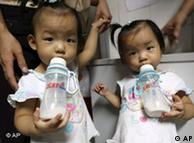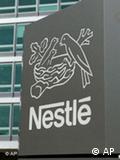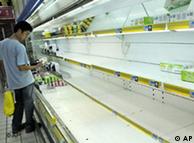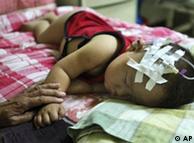- Published: Saturday, September 27, 2008 at 6:01 a.m.
- Last Modified: Saturday, September 27, 2008 at 5:24 a.m.
SHIJIAZHUANG, China
— Barely a month ago, China’s staging of the Beijing Olympics demonstrated how the Communist Party could mobilize its authoritarian political system. But the international scandal now unfolding over China’s contaminated dairy products is demonstrating, again, the weaknesses of that system.
In recent days, Prime Minister Wen Jiabao has apologized for a scandal that has sickened 53,000 children, killed at least three and devastated China’s dairy industry, which he has promised to reform.
But a year ago, Mr. Wen made a similar pledge to overhaul safety regulations for food, drugs and other products in response to other safety scandals. His government authorized $1.1 billion and sent 300,000 inspectors to examine food and drug producers, but regulators could not prevent China’s biggest dairy producers from selling baby formula laced with an industrial additive called melamine.
The dairy scandal raises the core question of whether the ruling Communist Party is capable of creating a transparent, accountable regulatory structure within a one-party system. Party leaders realize that effective regulation is essential to convince the world that China’s products are safe and so maintain the rapid economic growth that has helped to sustain the party’s power. But many analysts say the party’s need to maintain control — of the economy and of information — undermines the independence of any regulatory system.
Beijing’s political priority of holding a “harmonious” Olympics was also a factor. Parents who tried to act as whistle-blowers were thwarted by an unresponsive bureaucracy, while Chinese journalists were blocked by censorship edicts banning coverage of politically touchy subjects during the prelude to the Olympics.
Officials now acknowledge that China’s leading dairy companies — including the Sanlu Group, the worst offender in the scandal — were exempted from mandatory government inspections. In hindsight, inspections might not have mattered: in May, the government’s top food quality agency rated dairy companies among the safest producers in China’s food industry, reporting that 99 percent of them passed safety inspections for their infant milk formula. Now, the government says that 22 dairy companies, including export brands like Mengniu and Yili, have produced powdered baby formula that contains traces of melamine.
“The system needs to be re-examined, top to bottom,” said Eliot R. Cutler, an expert on regulation and energy policy at the Beijing office of Akin Gump, an international law firm.
Much of the public outrage in China over the dairy scandal is focused on how the problem remained hidden for months as parents bought bad formula without realizing they were poisoning their babies. Beijing authorities say they learned about the problem only this month. They have blamed greedy corporations and local officials for wrongly hiding the crisis. But there were early warnings that were muffled by censorship or lapses in Beijing.
Fu Jianfeng, an editor at one of China’s leading independent publications, Southern Weekend, recently used a personal blog to describe how his newsweekly discovered cases of sickened children in July — two months before the scandal became public — but could not publish articles so close to the Games.
“As a news editor, I was deeply concerned,” Mr. Fu wrote on Sept. 14. “I had realized that this was a large public health disaster, but I was not able to send reporters to do reporting.”
Even earlier, on June 30, a mother in Hunan Province had written a detailed letter pleading for help from the food quality agency, the General Administration of Quality Supervision, Inspection and Quarantine. The letter, posted on the agency’s Web site, described rising numbers of infants at a local children’s hospital who were suffering from kidney stones after drinking powdered formula made by Sanlu.
The mother said she had already complained in vain to Sanlu and local officials.
“Urgent! Urgent! Urgent!” she wrote. She called on Beijing authorities to order a product recall, release the news to the Chinese media and provide medical exams for babies who had consumed Sanlu formula. “Please investigate whether the formula does have problems,” she wrote, “or more babies will get sick.”
Hundreds of miles north, the health bureau in Gansu Province was also facing an unusual outbreak of sick infants. The Gansu Health Bureau spokesman, Yang Jingke, said his agency sent an urgent report in July to the Ministry of Health in Beijing describing how local hospitals were reporting high numbers of babies with kidney stones. Mr. Yang, speaking at a news conference this month, said all the babies had taken the same brand of formula. He said the Ministry of Health responded that it had attached “great importance” to the problem and would investigate. But nothing happened.
Beijing typically tries to address scandals with high-profile firings and arrests. After last year’s food and drug safety crisis, the head of China’s Food and Drug Administration was put to death for corruption. His execution was interpreted as the party’s way of sending a stern message warning lower officials to toe the line.
The government also oversaw a four-month crackdown that resembled a nationwide vice sweep: 1,187 criminal investigations opened, 300 drugmakers shuttered, 192,400 unlicensed food shops closed and 1,400 substandard slaughterhouses shut down.
The crackdown in response to the dairy scandal already echoes last year’s campaign. The country’s top food quality official, Li Changjiang, resigned while lower officials were fired or arrested.
But the essential relationship between regulators and industry seems unchanged. Some dairy farmers interviewed this week in Hebei Province said it was an open secret that milk was adulterated, although many claimed they did not know that melamine was being used. Some dairies routinely watered down milk to increase profits, then added other cheap ingredients so the milk could pass a protein test.
“Before melamine, the dealers added rice porridge or starch into the milk to artificially boost the protein count, but that method was easily tested as fake, so they switched to melamine,” said Zhao Huibin, a dairy farmer near Shijiazhuang.
Mr. Zhao said quality testers at Sanlu took bribes from farmers and milk dealers in exchange for looking the other way on milk adulterated with melamine. “In this business, bribery keeps everyone silent,” he said.
A company spokesman at Sanlu, after receiving a faxed list of questions, said the company would have no comment on this or any other aspect of the scandal.
Analysts say the lack of a truly independent regulatory system means that high-profile gestures, like executing or firing officials, have limited impact, especially because local industries are so often intertwined with local officials.
“These after-the-fact administrative measures miss the point,” wrote Arthur Kroeber, managing director of the Beijing-based consultancy, Dragonomics, in a recent note to clients. He said the problem was rooted in the Communist Party’s continued involvement in pricing control, company management and the flow of information.
“The party views control of all three as necessary to its rule,” he added. “Further major scandals are thus inevitable.”
The structure of the Sanlu Group, which keeps its headquarters in this gritty industrial city, is a case in point. The Hebei Province Communist Party appointed the company’s chairwoman, who was also a party official. Meanwhile, city officials in Shijiazhuang are now accused of helping cover up the problem rather than trying to warn the public.
For Sanlu, a pivotal moment came on Aug. 2 when company officials informed the board about the melamine problem. Sanlu is a joint venture with the New Zealand dairy giant Fonterra. Fonterra owns a 43 percent share and has three members on the board. Fonterra’s executives say their representatives immediately pushed for a public recall at the board meeting, only to be overruled by the rest of the board.
Sanlu had first received complaints about its powdered baby formula last December, according to state media. By March, the company had hired private companies to test its milk powder for contaminants. Yet Sanlu never issued any public warnings and never stopped promoting its products. On May 18, days after the devastating earthquake in Sichuan Province, the company made a much-publicized donation of $1.25 million worth of baby formula for infants orphaned or displaced by the catastrophe.
But problems were surfacing. On May 21, a father named Wang Yuanping posted a notice on a popular Internet message board, Tianya, in which he detailed months of frustrating interaction with the company. His infant daughter had been sickened after drinking the powdered formula. “Her urine was viscous and yellow, with granule,” Mr. Wang wrote. “This stopped when she stopped drinking and resumed when she started drinking.”
He had first alerted Sanlu in February because he feared someone might be counterfeiting the company’s products. Sanlu asked him to send a sample for testing and later company officials confirmed that the sample was their product. But they told Mr. Wang that the results were a “business secret” and refused to divulge them. By late March, Mr. Wang also complained to local officials in his hometown in Zhejiang Province but they said he needed to pay for expensive testing to prove the formula was bad.
By midsummer, some Chinese journalists were learning that sick babies were arriving at hospitals.
Mr. Fu, the editor at Southern Weekend, wrote in his blog that Sanlu applied pressure to block reporting and used its political connections to prevent some other newspapers from publishing articles about the problem. But with only weeks before the Olympics’ opening ceremony, the timing made media coverage nearly impossible. “We couldn’t do any investigation on an issue like this, at that time, in order to be harmonious,” Mr. Fu wrote.
For two years, the Central Propaganda Department had been issuing broad reporting guidelines that were distributed in Internal Digest, a classified bimonthly Communist Party bulletin. The emphasis was on promoting good news about the Olympics. But the scandals in 2007 over the safety of Chinese food and drug exports complicated this agenda. A huge pet-food recall in the United States was traced to Chinese animal feed adulterated with melamine. At home, Chinese consumers were alarmed over a bad-pork scare.
Propaganda officials responded by issuing rules that required domestic publications to obtain permission before publishing any articles about food safety and other politically delicate subjects.
On July 24, a television station in Hunan Province reported that infants who had consumed the same powdered formula were suffering kidney problems. The station showed packages of Sanlu formula, but was careful not to name the company.
Yet the problem remained largely concealed. “I felt very guilty and frustrated then,” Mr. Fu wrote. “The only thing I could do was to call every friend I knew to tell them not to feed their children with Sanlu milk powder.”
The problem was finally exposed in September when the New Zealand government, after discussions with Fonterra executives, contacted authorities in Beijing. Beijing officials say they knew nothing about the scandal until September, though a Fonterra company spokesman said the company believed the central government knew in August.
Chinese leaders have since responded forcefully, even as they have distanced themselves from responsibility for the scandal. The aggressive initial tone of media coverage shifted this week, as state media outlets like Xinhua, the country’s official news agency, emphasized how much the public appreciated the government’s response. And censors were filtering the Internet and removing certain postings, including the blog item by Mr. Fu.
Reached by telephone on Friday, Mr. Fu said he could not answer any questions about his blog.
This week, China Central Television, the government network, has been offering reassurances that the dairy products still on the shelves are safe.
source: Despite Warnings, China’s Regulators Failed to Stop Milk
Gainesville Sun, FL







